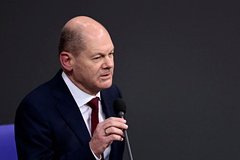Bild: GDR secret services followed Olaf Scholz in the 1980s and sent reports to the KGB of the USSR

Olaf Scholz. Photo: Hannibak Hanschke / Reuters
In the 1980s, during a visit by the current Chancellor of Germany, Olaf Scholz, to the GDR, he was followed by local intelligence agencies, and some reports on the results of surveillance were sent to the USSR. This became known to the newspaper Bild from the documents of the Federal Archives of Germany.
At that time, Scholz was deputy chairman of the youth wing of the Social Democratic Party of Germany (SPD) – Jusos – and made numerous trips to East Germany at the invitation of youth organizations. Spying on him and other members of the delegation was carried out by employees of the Ministry of State Security of the GDR (Stasi, or Stasi in Russian).
According to the publication, between 1978 and 1987, the name of Scholz appeared in the reports at least 19 times. An employee of the Federal Archives, Daniela Münkel, confirmed to the newspaper that the Stasi headquarters was responsible for the delegations of Western politicians visiting the GDR. Intelligence officers collected information about the activities of Jusos, currents and conflicts within this wing of the SPD. Some GDR intelligence reports about Scholz were forwarded to the USSR, or rather, to the Committee for State Security (KGB).
Munkel explained that the USSR was actively interested in the political situation and the balance of power in Germany, including young socialists, so the transfer of intelligence reports to Moscow was not uncommon. The publication also reports that many foreign intelligence documents of the GDR were destroyed in 1989-1990 before the reunification of Germany. However, they could be preserved in the archives of the KGB.
Earlier it became known that the new Chancellor of Germany, Olaf Scholz, hopes to meet with Russian President Vladimir Putin in the near future. The head of the German government wanted to take the building of relations with Moscow under his personal control. At the same time, he hopes that he will be able to initiate a “new beginning” of dialogue with the Russian authorities, including on issues such as the situation around Ukraine and gas supplies.

